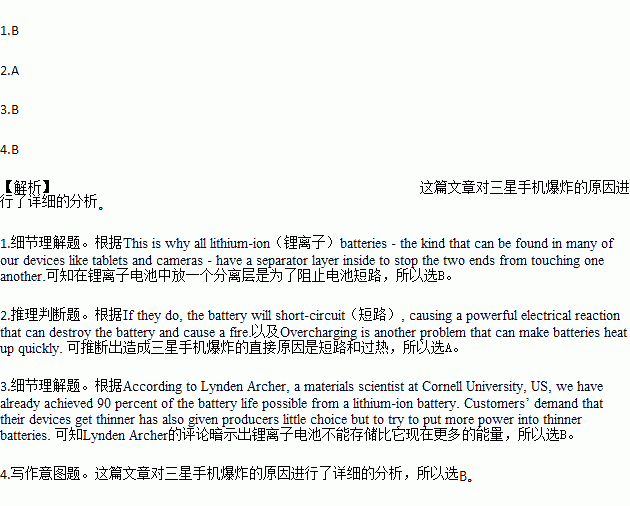题目内容
A cellphone is one of the few things that we hold close to our faces all the time, and yet it could possibly explode - this is what made the recent Samsung’s Galaxy Note 7 smart-phone accidents so shocking.
According to technology news website The Verge, flawed(有瑕疵的)phone batteries might be to blame.
Even if you are not a science student, you probably know that it is common sense that the anode (the negative(负的)end of the battery) and the cathode (the positive end) should never touch. If they do, the battery will short-circuit(短路), causing a powerful electrical reaction that can destroy the battery and cause a fire.
This is why all lithium-ion(锂离子)batteries - the kind that can be found in many of our devices like tablets and cameras - have a separator layer inside to stop the two ends from touching one another.
But somehow, the separators in some of the Samsung phones broke, causing explosions.
Overcharging is another problem that can make batteries heat up quickly. Fortunately, most batteries are designed to be able to automatically stop charging once they are fully charged. But again, this somehow failed to happen in some of the Samsung phones.
The two “somehows” may sound random(随机的)and hard to explain. But they actually both come from the fact that phone producers have been pushing the limits of batteries to meet customers’ demand for a longer battery life.
According to Lynden Archer, a materials scientist at Cornell University, US, we have already achieved 90 percent of the battery life possible from a lithium-ion battery. Customers’ demand that their devices get thinner has also given producers little choice but to try to put more power into thinner batteries.
“The more energy you put into a box, the more dangerous it’s going to be,” Billy Wu, a lecturer at Imperial College London, told The Guardian.
A thinner battery also means producers have to use thinner material for separators, and thinner material has more chance of breaking.
1.A separator layer is put in lithium-ion batteries in order to ___________.
A. ensure a longer battery life
B. prevent a battery from short circuiting
C. connect the anode and the cathode
D. reduce a certain electrical reaction
2.What are the direct reasons for the Samsung phone explosions?
A. Short circuiting and overheating
B. Pushing the limits of batteries
C. Overcharging and thinner batteries
D. Automatic charging and broken separators
3.Lynden Archer’s comments indicate that ___________.
A. demands for thinner cellphones are unreasonable
B. lithium-ion batteries can’t hold much more power than that they do now
C. producers can use 10 percent of a lithium-ion battery
D. new material for batteries is needed to meet consumers’ demands
4.What is the writer’s main purpose of writing the article?
A. To describe problems facing cellphone producers
B. To explain the reasons for the Samsung phone explosions
C. To teach us common sense when it comes to batteries
D. To warn us about the dangers of lithium-ion batteries

